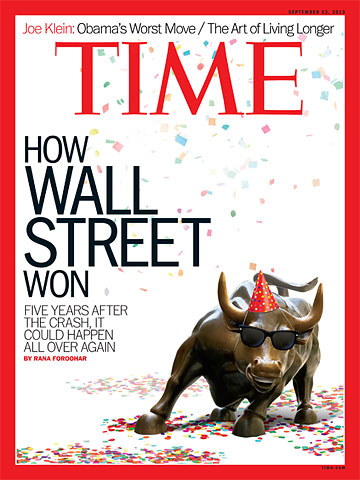
(4 of 6)
Commodity Futures Trading Commission (CTFC) chairman Gary Gensler has fought the good fight for stricter regulation of derivatives, bringing roughly half the interest-rate-swaps market (which was central to the crisis) out of the darkness and through central clearinghouses in the U.S. The CFTC has also made big progress on real-time reporting and registration of brokers. But it's been a long, hard slog, and thanks to its relentless lobbying of Congress and the Administration as well as regulators in the U.S. and overseas, Wall Street succeeded in carving out important loopholes in the Dodd-Frank derivatives rules. The loopholes make it possible, for example, for banks and hedge funds to continue their opaque, risky trading of complex securities like foreign-exchange derivatives in international markets--which means that fish as big as or bigger than the London Whale can keep diving, unseen, into the deepest and riskiest financial waters.
Gensler is a former Goldman Sachs derivatives expert who was working for then Treasury Secretary Robert Rubin in 1998 when the implosion of hedge fund Long-Term Capital Management (LTCM) threatened to bring down the U.S. financial system. The culprit: a $1.25 trillion swaps portfolio gone bad. Gensler remembers going out to LTCM's headquarters on a Sunday to investigate. "It quickly became clear to me that we had no idea what the ramifications would be in our financial system, and where, because these trades were booked in the Cayman Islands," he says. "It was a terrible feeling."
Gensler has made it a lot harder for U.S. financial institutions to hang their dirty laundry in the Caribbean. But weapons of mass financial destruction are still very much with us. "The banks got exactly what they wanted," says MIT's Johnson.
No. 4
Bring Shadow Banking Into the Light
One of the ways in which banks successfully lobbied to keep themselves more loosely regulated was by claiming that if they didn't do the risky trading, somebody else--like an even more loosely regulated hedge fund--would. Better to keep these trades out of the shadows and in the mainstream of Wall Street, or so the financiers' argument goes. But the idea that if banks were more tightly regulated, risk would migrate into the shadow banking world is nonsensical, since it's already there--evidenced not only by debacles like the one at Long-Term Capital Management but also by the trouble brewing today in areas as seemingly vanilla as money-market funds. Though they aren't FDIC-insured, many people think of them as the next best thing to cash.
